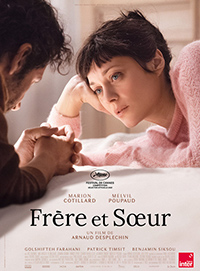I’m Not One of Your Fans: Desplechin Delivers Camp Classic with Failed Melodrama
 No one depicted in Frère et soeur (Brother and Sister), the latest melodrama from esteemed French director Arnaud Desplechin, is having anything near a genuine human experience. A perennial favorite amongst critics, it would seem when he’s good, he’s very, very good. But when he’s bad, he’s awful.
No one depicted in Frère et soeur (Brother and Sister), the latest melodrama from esteemed French director Arnaud Desplechin, is having anything near a genuine human experience. A perennial favorite amongst critics, it would seem when he’s good, he’s very, very good. But when he’s bad, he’s awful.
Desplechin’s script, co-written by frequent collaborator Julie Peyr, is so stuffed with outrageously bad dialogue it’s difficult to know where to begin discussing how terrible it is, and embarrassing for a cast (including his regular, Marion Cotillard) of notable actors chewing scenery so ferociously one has no choice but to desire experiencing it again.
A dysfunctional familial melodrama wherein a brother and sister so vehemently loathe one another they haven’t spoken in twenty years, Desplechin begins at fever pitch and bears down on a shriek temperament until the finale, where screaming maudlin dialogue completely replaces all semblance of authentic emotion. Every choice made here is miscalculated, over performed, and under directed. Lovers of failed art, rejoice—you have a new feather for your cap.
When successful author Louis (Melvil Poupaud) and his wife Faunia (Golshifteh Farahani) unexpectedly lose their six year old son, Alice (Cotillard), his older sister and famed actress, shows up to offer her condolences. She is immediately kicked out in a tidal wave of rage from her brother as she never met the child due to their estrangement. Another five years pass. Their parents, Marie-Louise (Nicolette Picheral) and Abel (Joel Cudennec) are hospitalized after a car accident and the family is forced to rally together in support. As their parents’ injuries dictate impending death, Louis and Alice must somehow come to grips with getting over their hatred for one another.
Like one of Liz Taylor and Richard Burton’s later projects, where they all do is sit around and scream at one another, Brother and Sister exists in some strange parallel universe where Andrzej Zulawski directed Boom! (1968), but without any of the fun such a creation suggests. Exasperating from its opening moments (you know you’re in for something when you notice Louis has a framed portrait of Kafka hanging in the apartment during the wake for his son), it quickly devolves into a shriek fest where it becomes impossible to determine if Marion Cotillard or Melvil Poupaud is giving the worse performance.
To be fair, the dialogue they’ve been assigned to shout is something else. “You don’t know anything about loss,” Louis shrieks when apprehended by police for public drunkenness. Castigating his teenage nephew (whose mannerisms are so uncomfortable the child could be a robot programmed for constant pleasant surprise) in a bookstore, Louis screams, “Nice people are bland! Your silence all these years dooms you!” If Poupaud might have a bit more of these moments, just wait until Cotillard ramps up, fainting in the hallway in the hospital at the mere sight of her brother, crying and wailing constantly, and then tethered to a subplot about an Eve Harrington-styled Romanian waif who waits for her outside of the theater every night (she can’t afford food but manages to pay for theater tickets).
“I can’t stand her vulnerability,” Alice explains to her husband, suggesting her attraction to Lucia is really thinly concealed loathing. Their younger gay brother Fidele (Benjamin Siksou) is utilized merely as a convenient conduit to get the gang together for their stricken parents, while Golshifteh Farahani, meant to be a bedrock for Louis, comes across as a toxic enabler for his obnoxious behavior. Nothing whatsoever is natural in the film, not the overly compounded accident which mauled Marie-Louise and Abel, not a furiously stupid exchange in the pharmacy with Alice (further aggravated by a supremely misplaced score from Gregoire Hetzel), and certainly not any of the grating bits of small talk peppered throughout the film’s innocuous exchanges. Nothing is salvageable as quality in Brother and Sister. It is a familial dysfunction misfire at the level of the Joan Crawford celebrity biopic Mommie Dearest (1981).
Brother and Sister bears similar energies to more renowned Desplechin titles, particularly the oddly charming black comedy A Christmas Tale (2008), where another family of intimate vipers gathers (and also featured Poupaud). But there’s nary a second of screen time in his latest film suggesting anyone in control has an inkling of what such a scenario would look like.
For all the hand wringing and sensational outbursts, the explanation for this emotional chasm between siblings is explained away as a decision they naturally gravitated towards. In other words, they simply chose to hate each other rather than love, born from a sense of competition for creative success (think the rivalry between famed sisters Olivia de Havilland and Joan Fontaine, for instance). Desplechin’s film belongs to an accidental category of sci-fi melodrama because there’s nothing human about these bothersome privileged composites.
Reviewed on May 20th at the 2022 Cannes Film Festival – Main Competition. 110 Mins
½/☆☆☆☆☆


